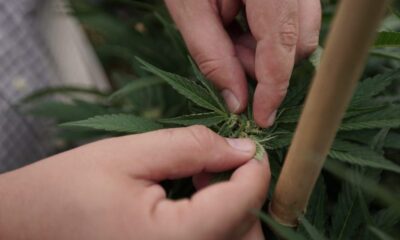featured
Vireo Growth Acquires Deep Roots Harvest for $133 Million in Nevada
Published
7 hours agoon

[PRESS RELEASE] – MINNEAPOLIS, June 9, 2025 – Vireo Growth Inc. announced that it has closed its previously announced transaction to acquire Nevada-based Deep Roots Holdings Inc.
Deep Roots was founded in 2023 and is a consistently solid operator in Nevada’s mature cannabis market, with a 54,000-square-foot cultivation and manufacturing facility and ten active retail dispensaries. The company maintains strong relative performance due to favorable contributions from strategically situated stores in Southern Nevada on the Utah border. Also, it holds equity and debt investments in a retail chain in California, and a vertical operator in Ohio and Massachusetts.
Total consideration for the transaction was $132.7 million, paid in the form of 255.2 million subordinate voting shares of Vireo at a reference price per share of $0.52. The purchase price of the Deep Roots transaction represents a multiple of 4.175x 2024 “closing EBITDA” of $30 million. The transaction is subject to claw-back provisions if 2026 EBITDA is below closing EBITDA as of Dec. 31, 2026. The selling shareholders agreed to voluntary share lock-up provisions, with tranches of shares received in connection with the closing unlocking over a 33-month period.

Author: mscannabiz.com
MScannaBIZ for all you Mississippi Cannabis News and Information.
You may like
-


South Carolina Farmers, Once Hopeful About Hemp’s Economic Potential, Are Turning Away From The Crop
-


Marijuana Users Are Nearly 5 Times As Likely To Regularly Exercise Than Eat Fast Food, Stereotype-Busting Survey Shows
-


Ban considered on new medical marijuana dispensaries in Deltona, causing concerns
-


Alcohol And Cannabis Consumer Behavior Evolving
-


LSF Health Systems Offers Help for Teens Using Marijuana
-


Ohio Raises Cannabis Purchasing Limit
featured
South Carolina Farmers, Once Hopeful About Hemp’s Economic Potential, Are Turning Away From The Crop
Published
4 minutes agoon
June 9, 2025
“There was an oversupply of the market, and the prices collapsed.”
By Shaun Chornobroff, South Carolina Daily Gazette
Thomas Garrison, a multi-generation farmer in Anderson County, said he believed the hype around hemp.
Garrison, who’s farmed in Pendelton since graduating from Clemson in 1980, was among the group who pushed for a 2017 law that allowed farmers in the state to grow hemp, a plant that’s the same species as marijuana but lacks the THC that gets people high.
Despite being one of the state’s hemp pioneers, he abandoned the crop after just two seasons. He didn’t even seek a permit in 2020. Garrison told the SC Daily Gazette his venture into hemp was probably the worst in his 45 years as a farmer.
It’s a risk that Garrison estimates cost him more than $100,000 in unused crops, equipment and time spent, said the 67-year-old son of the late state Sen. T. Ed Garrison, namesake of the livestock arena at Clemson. He declined to specify how much he lost.
“It was not a very good experience,” he said.
Hemp was supposed to be the next moneymaker for South Carolina farmers. And once they were able, the farmhands flocked to the opportunity.
Many suffered similar fates to Garrison.
Farmers and lawmakers described the hemp industry as an unregulated battle for survival, where supply ultimately outweighed the demand, causing many to ditch the crop altogether.
“It was like the Wild West,” Garrison recently told the SC Daily Gazette.
From 20 to 265
After the 2017 law passed, 20 farmers received a permit to grow hemp on a maximum 20 acres each in the state’s pilot program. More than 100 applicants were denied. Among the 20 were Danny Ford, Clemson’s first national championship football coach, and former state Rep. Chip Limehouse (R).
The pilot program created by the 2017 law allowed a doubling in 2019 to 40 permits farming 40 acres each.
But in the wake of the 2018 federal Farm Bill that legalized the crop nationwide, the Legislature passed another law in March 2019 that deleted the constraints and allowed the state Department of Agriculture to issue licenses to any farmer who met the legal criteria.
The agency ended up giving 161 permits for the 2019 crop. For 2020, the number rocketed to 265.
But this year, the number of farmers with permits is down to 80.
It’s unclear how many of those 80 farmers actually grow hemp. Some of the farmers go through the process to get licensed, which costs about $600 and involves a background check. But they aren’t planting hemp. They’re just keeping their options open.
Among the factors that could have affected a desire to grow the crop was the 2019 arrest of Lowcountry farmer John Trenton Pendarvis.
Law enforcement claimed his 10 acres of hemp in Harleyville were unregistered and mowed it down the same day.
Pendarvis, the first person charged with violating the state’s hemp-growing law, filed a lawsuit against the State Law Enforcement Division (SLED), including SLED Chief Mark Keel in his official capacity, Attorney General Alan Wilson and others.
The suit led to SLED being forced to pay more than $11,000 in attorney fees to Pendarvis in 2023 for its handling of the lawsuit’s discovery process. A SLED spokesperson declined the allegations at the time.
The mess could have deterred farmers who were worried about being targeted, said state Sen. Brad Hutto, Pendarvis’ lawyer.
“I think it definitely had a chilling effect,” Hutto (D-Orangeburg) told the SC Daily Gazette. “They put a farmer in jail when he was growing a legal crop.”
The case is ongoing. Hutto doesn’t expect a resolution until at least late summer.
When South Carolina first permitted farmers to grow hemp, lawmakers and farmers thought they were getting in on the next big cash crop.
Most farmers have a primary crop that they make money on. Hemp was supposed to provide a year-round option to grow for lots of different uses, including clothing, food, textiles and even paper.
Encouraging its growth was supposed to allow farmers to continue profiting at times when their main crop could not grow, said House Majority Leader Davey Hiott, who chaired the House agriculture committee when the hemp laws passed.
“It was supposed to help them make a little bit of money,” said the Pickens Republican.
A decade ago, Hiott was eager to see farmers capitalize on the industrial use of hemp, such as clothing. In 2017, Pickens County was home to 740 farms, according to the U.S. Department of Agriculture,
“It started that way. It didn’t end that way,” Hiott said.
David Dewitt, an agronomist at Clemson University said, “what people really want to do is alter their state of mind.”
CBD problems
In 2014, the Legislature passed a law legalizing the sale of CBD, or cannabidiol, a hemp-derived, non-psychoactive oil used for various ailments. But that state law was very limited, authorizing it only for patients diagnosed with severe epilepsy.
After the 2018 federal law broadened what was legal, farmers saw an opportunity. And the large majority of hemp growers in the state wanted in.
And that’s when problems started, farmers told the Gazette.
James Fairey, a 50-year-old from Williamston, started growing hemp in 2020, the state’s peak for permits.
Even after others bowed out of the industry, he continued to grow. After four years of losing money, he finally turned a profit on the crop in 2024. He credits a gradually growing customer base and a willingness to learn along the way for reversing his fortunes.
The biggest difference between him and most growers, he said, is he started growing hemp because he believes in the ailment-relieving health benefits of CBD. The money was secondary.
“The only currencies that matter are health and kindness, and that’s what I provide,” Fairey said.
When hemp growers first started growing, the biomass material used for CBD could be sold for up to $60 a pound, DeWitt said. A couple of years later, farmers were offered as little as $5 per pound.
“Nobody wants to grow something they can’t sell,” DeWitt said.
If the market changes, licensed farmers who are sitting on the sidelines may jump back in.
“Some of them have planted very little, but there’s no penalty for not planting it,” Dewitt said.
Other early hemp growers included Cannalina Hemp Company, formerly known as Charleston Hemp Company.
The company started in 2018 and grew its own hemp, while operating a storefront.
In 2020, the decision was made to stop growing the crop.
“There was an oversupply of the market, and the prices collapsed,” said Lina Wu, the company’s owner.
However, there was still money to be made in selling the CBD gummies, oils, vapes, lotions and other edibles.
The Cannalina Hemp Company’s Goose Creek retail location is open and operating. It has a loyal customer base, buys from numerous South Carolina hemp growers and prides itself on carrying quality products at an affordable price, according to its Facebook profile.
However, there are “a lot cheaper products out there, especially in gas stations,” Wu said.
When asked if the business would ever return to growing its own hemp, Wu said now is not the time.
“There’s too many growers on the market,” she said.
Kurt Brower, the co-owner of Carolina Botanicals, echoed a similar sentiment after losing about $200,000 in his venture. Though the company maintains a hemp license, it doesn’t make economic sense to grow hemp right now, he said.
Brower now focuses on processing biomass for farmers into products they can sell, as well as selling their own products.
The 27-year-old said he previously bought hemp exclusively from South Carolina farmers, but as the number of producers has dropped, he’s had to start buying from farmers in neighboring Georgia and North Carolina.
“There’s no outlet of sale on the hemp side” for farmers, he said. “It put a chokehold” on growers.
What’s next
Hiott, the House majority leader, said hemp is no longer on his radar.
Eva Moore, a spokesperson with the state Department of Agriculture, said recruitment isn’t a problem, farmers are often intrigued by growing hemp. But a shift from CBD to growing hemp for fiber or grain would open up new economic opportunities.
Moore said she’s heard reports that processors are still sitting on hemp they bought in 2022.
“The market has not been great for farmers,” Moore said. “Whether you’re growing cotton, peaches or hemp, you have to be able to make a living doing it.”
This story was first published by South Carolina Daily Gazette.
Photo courtesy of Chris Wallis // Side Pocket Images.

Author: mscannabiz.com
MScannaBIZ for all you Mississippi Cannabis News and Information.
featured
Marijuana Users Are Nearly 5 Times As Likely To Regularly Exercise Than Eat Fast Food, Stereotype-Busting Survey Shows
Published
1 hour agoon
June 9, 2025
Marijuana consumers are more than three times more likely to regularly exercise than drink alcohol—and they’re nearly five times more likely to routinely work out than eat fast food—according to another stereotype-defying survey.
The poll from the cannabis telehealth platform NuggMD looked at the habits of cannabis users, who were asked about the frequency they engage in seven different activities—from alcohol consumption to movie theater attendance.
One of the takeaways was that marijuana consumers reported regularly engaging in exercise (27.4 percent daily and 34.9 percent multiple times per week) significantly more often than using alcohol (6.1 percent daily and 11.3 percent multiple times per week).
Another finding from the survey was that cannabis consumers are 4.8 times more likely to regularly exercise than to eat fast food (1.5 percent daily and 11.5 percent multiple times per week).
“This finding is yet more evidence that today’s cannabis consumers defy the prohibitionist stereotype of layabouts munching Doritos and then crossfading with booze to get their fix,” Andrew Graham, head of communications at NuggMD, told Marijuana Moment.
“The data shows that cannabis consumers self-report several healthy lifestyle habits. When compared with federal data on exercise and fast food consumption, our poll shows that cannabis consumers are in fact more likely to exercise and less likely to eat fast food than the average U.S. adult,” he said. “Previous polling we’ve done shows cannabis has a distinct replacement effect on alcohol use, and this poll charts a similar direction.”
“For millions of wellness-focused Americans, cannabis is simply part of the routine. It’s kind of mind-blowing how wrong the prohibitionist crowd is about everything,” Graham said.
Several other studies have similarly found that cannabis users exercise at average or above-average levels compared to non-users, bucking the long-held stigma that marijuana makes people lazy. This is one of the latest data points to show the same.
Notably, the new poll also found that relatively few marijuana consumers frequently use food delivery services, with just 3.3 percent reporting that they order delivery daily and 8.3 percent saying they use such services multiple times a week.

Via NuggMD.
In contrast, 69.5 percent of respondents said they drink coffee regularly. Only 4.5 percent said they often visit movie theaters. And 64.8 percent said they routinely take nutritional supplements.
The survey from NuggMD involved interviews with 603 cannabis consumers, with a +/- 4 percentage point margin of error.
Meanwhile, last year a study found that marijuana consumption prior to exercise can lead to greater enjoyment and an enhanced “runner’s high.”
Another study published in 2023 surveyed 49 runners and found that participants experienced “less negative affect, greater feelings of positive affect, tranquility, enjoyment, and dissociation, and more runner’s high symptoms during their cannabis (vs. non-cannabis) runs.” Participants did run 31 seconds slower per mile when using marijuana, but researchers said that was not statistically significant.
The positive effects of cannabis that the runners reported is consistent with the findings of a 2019 study, which found that people who use marijuana to elevate their workout tend to get a healthier amount of exercise.
Older people who consume cannabis are also more likely to engage in physical activity, according to another study that was published in 2020.
Similarly, in another stereotype-busting study that was published in 2021, researchers found that frequent marijuana consumers are actually more likely to be physically active compared to their non-using counterparts.
Marijuana Dispensary Offers Free Joints For Pics Of Bigfoot Following Local Sighting

Author: mscannabiz.com
MScannaBIZ for all you Mississippi Cannabis News and Information.

Their is a new wave of behavior around drinking in public which could have a major impact on the alcohol and cannabis industry.
In bars across the country, a subtle shift is underway: younger patrons, especially Gen Z and Zillennials, are increasingly saying no thanks to opening a tab. It’s not about being antisocial—it’s about financial control, digital habits, and a shifting relationship with nightlife. The younger generation is increasingly turning away from alcohol. A portion are favoring marijuana for relaxation and socializing. Health consciousness, mental wellness, and shifting cultural norms drive this trend.
RELATED: Mixed Messages From The Feds About Cannabis
Unlike older generations who were more comfortable running a tab and settling up at the end of the night, Gen Z and Zillennials are hyper-aware of where their money is going in real-time. Growing up in the aftermath of the 2008 financial crisis and amid rising costs of living, this generation approaches spending with caution. Mobile banking, budgeting apps, and real-time transaction alerts have made them more vigilant. Opening a bar tab? That’s an invitation to overspend.

There’s also the trust factor. Horror stories of mystery charges, lost credit cards, or bars adding gratuities without consent have circulated widely on TikTok and Reddit. Many in this demographic prefer to pay per drink or use digital wallets like Apple Pay or Venmo, minimizing risk and maximizing transparency.
Technology plays a role too. While bar tabs require handing over a physical credit card—something that feels outdated to a smartphone-native generation—Gen Z prefers the immediacy and security of tapping a phone or using a QR code. Bars that still rely on old-school POS systems may seem out of step.
RELATED: Cannabis Is Way Better And Safer Than A Honey Pack
Culturally, going out doesn’t necessarily mean bingeing at a bar anymore. Many younger adults are opting for sober-curious lifestyles or limiting alcohol consumption, and when they do drink, they prefer to keep things low-key and affordable. Also, they see xannabis is seen as a safer, more mindful alternative, aligning with their preference for personalized, low-risk experiences over traditional, high-impact substances like alcohol.
For bar owners, this trend is a wake-up call. Offering easy, transparent, and tech-forward payment options—like mobile ordering and contactless checkout—can help retain Gen Z patrons. Those who resist these shifts risk alienating a generation that values financial autonomy over tradition.
The bottom line? For Gen Z and Zillennials, closing out a tab one drink at a time isn’t just practical—it’s personal.

Author: mscannabiz.com
MScannaBIZ for all you Mississippi Cannabis News and Information.

South Carolina Farmers, Once Hopeful About Hemp’s Economic Potential, Are Turning Away From The Crop

Marijuana Users Are Nearly 5 Times As Likely To Regularly Exercise Than Eat Fast Food, Stereotype-Busting Survey Shows

Ban considered on new medical marijuana dispensaries in Deltona, causing concerns

Alcohol And Cannabis Consumer Behavior Evolving

LSF Health Systems Offers Help for Teens Using Marijuana

Ohio Raises Cannabis Purchasing Limit

Marijuana Dispensary Offers Free Joints For Pics Of Bigfoot Following Local Sighting

First Cannabis Business Licenses Awarded in Minnesota

Major Alcohol Industry Group Pushes Congress To Dial Back Proposed Hemp Product Ban

Vireo Growth Acquires Deep Roots Harvest for $133 Million in Nevada

Feds Warn Retailers That Accepting Welfare Benefits For Marijuana Or CBD Could Result In ‘Criminal Prosecution’

Congressional Cannabis Caucus leader OK with hemp ban (Newsletter: June 9, 2025)

Lawmakers approve governor’s picks for Nebraska’s new Medical Marijuana Commission

Smoking marijuana, using gummies linked to heart disease in new study

Ohioans can soon buy over twice as much nonmedical marijuana

Rhode Island Bills To Restrict Hemp THC Drinks Ignore Science And Current Regulations (Op-Ed)

Video Cannabis use on the rise among seniors study shows

Missouri Officials Will Begin Unannounced Marijuana Dispensary Visits For New Product Testing Initiative Next Month

Gov. Josh Stein launches cannabis task force, seeking to regulate THC and study pot legalization in NC

Musk’s 'Govt Efficiency' Ends In MAYHEM: Cockroaches, Marijuana & Wiped Research At USIP

Deltona considers ban on new medical marijuana dispensaries

New recreational marijuana shop in Moorhead nearly two weeks since opening

Law enforcement say testing drivers for marijuana use presents challenges

Louisville man caught with 15 pounds of THC edibles, marijuana wax in Sumner County

Alert: Department of Cannabis Control updates data dashboards with full data for 2023

5 best CBD creams of 2024 by Leafly

Connecticut Appoints The US’s First Cannabis Ombudsperson – Yes there is a pun in there and I’m Sure Erin Kirk Is Going To Hear It More Than Once!

Free delta-9 gummies from Bay Smokes
New Study Analyzes the Effects of THCV, CBD on Weight Loss

EU initiative begins bid to open access to psychedelic therapies

Mississippi city official pleads guilty to selling fake CBD products

May 2024 Leafly HighLight: Pink Runtz strain

Curaleaf Start Process Of Getting Their Claws Into The UK’s National Health System – With Former MP (Resigned Today 30/5/24) As The Front Man

Horn Lake denies cannabis dispensary request to allow sale of drug paraphernalia and Sunday sales | News

Press Release: CANNRA Calls for Farm Bill to Clarify Existing State Authority to Regulate Hemp Products

5 best autoflower seed banks of 2024 by Leafly

Discover New York’s dankest cannabis brands [September 2024]

Local medical cannabis dispensary reacts to MSDH pulling Rapid Analytics License – WLBT

Nevada CCB to Accept Applications for Cannabis Establishments in White Pine County – “Only one cultivation and one production license will be awarded in White Pine County”

The Daily Hit: October 2, 2024

6 best CBD gummies of 2024 by Leafly

5 best THC drinks of 2024 by Leafly

Weekly Update: Monday, May 13, 2024 including, New Guide for Renewals & May Board meeting application deadline

5 best delta-9 THC gummies of 2024 by Leafly

People In This State Googled ‘Medical Marijuana’ The Most, Study Shows

PRESS RELEASE : Justice Department Submits Proposed Regulation to Reschedule Marijuana

Press Release: May 9, STIIIZY and Healing Urban Barrios hosted an Expungement Clinic & Second Chance Resource Fair

Thailand: Pro-cannabis advocates rally ahead of the government’s plan to recriminalize the plant
Trending
-

 California Cannabis Updates1 year ago
California Cannabis Updates1 year agoAlert: Department of Cannabis Control updates data dashboards with full data for 2023
-

 best list10 months ago
best list10 months ago5 best CBD creams of 2024 by Leafly
-

 Breaking News1 year ago
Breaking News1 year agoConnecticut Appoints The US’s First Cannabis Ombudsperson – Yes there is a pun in there and I’m Sure Erin Kirk Is Going To Hear It More Than Once!
-

 Bay Smokes12 months ago
Bay Smokes12 months agoFree delta-9 gummies from Bay Smokes
-

 cbd1 year ago
cbd1 year agoNew Study Analyzes the Effects of THCV, CBD on Weight Loss
-

 Business9 months ago
Business9 months agoEU initiative begins bid to open access to psychedelic therapies
-

 Mississippi Cannabis News1 year ago
Mississippi Cannabis News1 year agoMississippi city official pleads guilty to selling fake CBD products
-

 California1 year ago
California1 year agoMay 2024 Leafly HighLight: Pink Runtz strain


